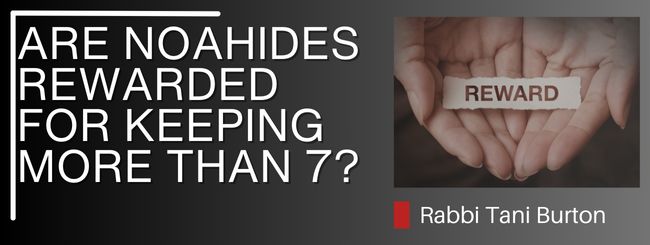בס”ד
- Mishna Terumot 3:9
| The terumah of a non-Jew or a Samaritan is considered terumah, and their hekdesh is considered hekdesh. | הַנָּכְרִי וְהַכּוּתִי, תְּרוּמָתָן תְּרוּמָה, וּמַעַשְׂרוֹתֵיהֶן מַעֲשֵׂר, וְהֶקְדֵּשָׁן הֶקְדֵּשׁ |
2. Rashi, commentary on Numbers 23:4
| “The seven altars”: The verse does not say, “I have arranged seven altars”, but rather, “the seven altars”. He said before G-d, “their forefathers built seven altars before You, and I have built these accordingly”. | את שבעת המזבחת. שִׁבְעָה מִזְבְּחֹת עָרַכְתִּי אֵין כְּתִיב כָּאן, אֶלָּא אֶת שִׁבְעַת הַמִּזְבְּחֹת, אָמַר לְפָנָיו אֲבוֹתֵיהֶם שֶׁל אֵלּוּ בָּנוּ לְפָנֶיךָ שִׁבְעָה מִזְבְּחוֹת וַאֲנִי עָרַכְתִּי כְּנֶגֶד כֻּלָּן |
3. Rambam, Laws of Kings and Wars 10:9
| A non-Jew who occupies himself with the study of Torah is liable to the death penalty; he should only occupy himself with Torah study as it pertains to his Seven Mitzvot. Similarly, a non-Jew who observes the sabbath is liable to the death penalty, even if he observes a sabbath rest on any other day of the week. The overarching guideline is that we do not permit him to invent a new religion or to create commandments for himself. Either he should convert and accept all of the mitzvot, or he should busy himself with teachings that apply specifically to him, and not add to or subtract from them. And if he studies Torah or observes a sabbath, he is given corporal punishment and we inform him that he is liable to the death penalty, but he is not executed. | עַכּוּ”ם שֶׁעָסַק בַּתּוֹרָה חַיָּב מִיתָה. לֹא יַעֲסֹק אֶלָּא בְּשֶׁבַע מִצְוֹת שֶׁלָּהֶן בִּלְבַד. וְכֵן עַכּוּ”ם שֶׁשָּׁבַת אֲפִלּוּ בְּיוֹם מִימוֹת הַחל אִם עֲשָׂאָהוּ לְעַצְמוֹ כְּמוֹ שַׁבָּת חַיָּב מִיתָה. וְאֵין צָרִיךְ לוֹמַר אִם עָשָׂה מוֹעֵד לְעַצְמוֹ. כְּלָלוֹ שֶׁל דָּבָר אֵין מְנִיחִין אוֹתָן לְחַדֵּשׁ דָּת וְלַעֲשׂוֹת מִצְוֹת לְעַצְמָן מִדַּעְתָּן. אֶלָּא אוֹ יִהְיֶה גֵּר צֶדֶק וִיקַבֵּל כָּל הַמִּצְוֹת. אוֹ יַעֲמֹד בְּתוֹרָתוֹ וְלֹא יוֹסִיף וְלֹא יִגְרַע. וְאִם עָסַק בַּתּוֹרָה אוֹ שָׁבַת אוֹ חִדֵּשׁ דָּבָר. מַכִּין אוֹתוֹ וְעוֹנְשִׁין אוֹתוֹ וּמוֹדִיעִין אוֹתוֹ שֶׁהוּא חַיָּב מִיתָה עַל זֶה. אֲבָל אֵינוֹ נֶהֱרָג |
4. TB Sanhedrin 58b
| And Reish Lakish said, “a Gentile who rests on the Sabbath is liable to the death penalty as the verse states (Genesis 8:22), ‘day and night, they shall not cease’”…Ravina said, “even if they rest on Monday”. | ואר”ל עובד כוכבים ששבת חייב מיתה שנא’ (בראשית ח, כב) ויום ולילה לא ישבותו ואמר מר אזהרה שלהן זו היא מיתתן אמר רבינא אפי’ שני בשבת |
5. TB Sanhedrin 59a
| And Rabbi Yochanan said, “a Gentile who occupies himself with Torah study is liable to the death penalty” as the verse states (Deuteronomy 33:4), ‘the Torah was commanded to us by Moses; it is an inheritance of the community of Jacob’. It is an inheritance for us, not for them. | ואמר ר’ יוחנן עובד כוכבים שעוסק בתורה חייב מיתה שנאמר (דברים לג, ד) תורה צוה לנו משה מורשה לנו מורשה ולא להם |
6. Rambam, Laws of Kings and Wars 8:11
| Anyone who accept upon himself the Seven Mitzvot and is careful to perform them is considered as one of the pious amongst the nations and has a share in the World to Come—but this refers to a person who accepts them and does them because the Holy One, Blessed be He, commanded them in the Torah and informed us through Moses that the Children of Noah had been thus commanded from ancient times. | כָּל הַמְקַבֵּל שֶׁבַע מִצְוֹת וְנִזְהָר לַעֲשׂוֹתָן הֲרֵי זֶה מֵחֲסִידֵי אֻמּוֹת הָעוֹלָם. וְיֵשׁ לוֹ חֵלֶק לָעוֹלָם הַבָּא. וְהוּא שֶׁיְּקַבֵּל אוֹתָן וְיַעֲשֶׂה אוֹתָן מִפְּנֵי שֶׁצִּוָּה בָּהֶן הַקָּדוֹשׁ בָּרוּךְ הוּא בַּתּוֹרָה וְהוֹדִיעָנוּ עַל יְדֵי משֶׁה רַבֵּנוּ שֶׁבְּנֵי נֹחַ מִקֹּדֶם נִצְטַוּוּ בָּהֶן. אֲבָל אִם עֲשָׂאָן מִפְּנֵי הֶכְרֵעַ הַדַּעַת אֵין זֶה גֵּר תּוֹשָׁב וְאֵינוֹ מֵחֲסִידֵי אֻמּוֹת הָעוֹלָם וְלֹא מֵחַכְמֵיהֶם |
7. Rambam, Laws of Kings and Wars 10:10
| A Ben Noach who wants to keep more of the Torah’s commandments, in order to receive reward, we do not prevent him from keeping these commandments according to their parameters. If he brings an elevation-offering, we accept it; if he gives tzedakah, we accept it, and it seems to me that we would even give it to the poor of Israel. | בֶּן נֹחַ שֶׁרָצָה לַעֲשׂוֹת מִצְוָה מִשְּׁאָר מִצְוֹת הַתּוֹרָה כְּדֵי לְקַבֵּל שָׂכָר. אֵין מוֹנְעִין אוֹתוֹ לַעֲשׂוֹתָהּ כְּהִלְכָתָהּ. וְאִם הֵבִיא עוֹלָה מְקַבְּלִין מִמֶּנּוּ. נָתַן צְדָקָה מְקַבְּלִין מִמֶּנּוּ. וְיֵרָאֶה לִי שֶׁנּוֹתְנִין אוֹתָהּ לַעֲנִיֵּי יִשְׂרָאֵל. הוֹאִיל וְהוּא נִזּוֹן מִיִּשְׂרָאֵל וּמִצְוָה עֲלֵיהֶם לְהַחְיוֹתוֹ. אֲבָל הָעַכּוּ”ם שֶׁנָּתַן צְדָקָה מְקַבְּלִין מִמֶּנּוּ וְנוֹתְנִין אוֹתָהּ לַעֲנִיֵּי עַכּוּ”ם |
By Rabbi Tani Burton
More shiurim of Rabbi Tani Burton
© Copyright, all rights reserved. If you enjoyed this article, we encourage you to distribute it further.
Our blogs may contain text/quotes/references/links that include copyright material of Mechon-Mamre.org, Aish.com, Sefaria.org, Chabad.org, and/or AskNoah.org, which we use in accordance with their policies.
